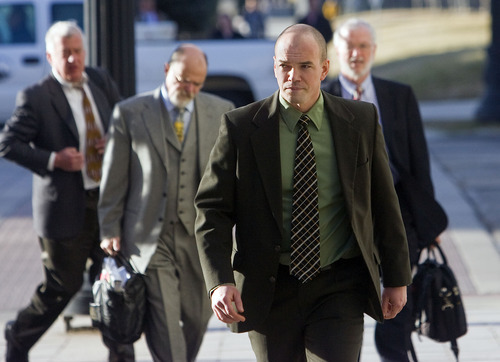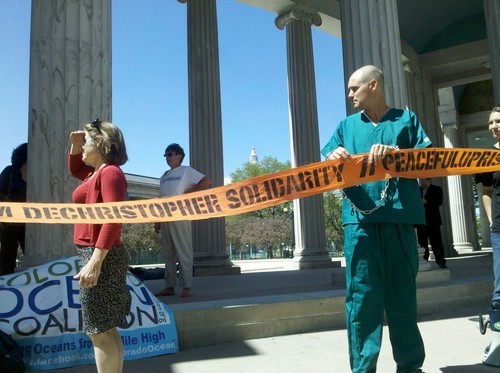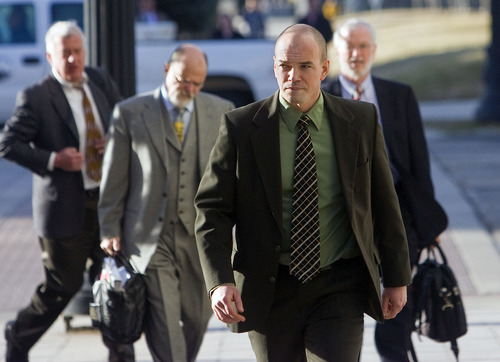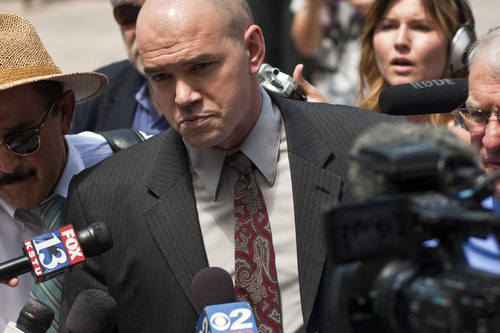This is an archived article that was published on sltrib.com in 2012, and information in the article may be outdated. It is provided only for personal research purposes and may not be reprinted.
Denver • Tim DeChristopher's attorney on Thursday finally got to argue that his client had no choice but to disrupt a Utah oil and gas lease auction because it was illegal.
Pressed for time as his 15 minutes before the 10th Circuit Court of Appeals shrunk with each technical question coming from the three-judge panel, Ron Yengich finally asked to get to what he viewed as "critical" in overturning the conviction and two-year sentence imposed on DeChristopher, the Salt Lake City activist who succeeded in disrupting a Bureau of Land Management auction on Dec. 19, 2008.
The leases for sale that day at the end of George W. Bush's presidency had inadequate environmental review, the Obama administration would later find in revoking them, and Yengich argued that DeChristopher's trial judge should have allowed him to tell jurors that he made false bids at the auction only to stop an illegal proceeding.
"Mr. DeChristopher's actions effectively stopped the lease process and gave the new administration the opportunity to review it and then move forward," Yengich told the judges, who will decide later whether the former University of Utah economics major should get a new trial or be released from the California prison camp where he has spent nine months.
If they instead rule for the government, prison officials have told DeChristopher they will move him to a minimum-security camp in Littleton, Colo., he reported to friends this week. That would put him nearer to his parents, who live a couple of hours away, in Buena Vista.
The judges challenged Yengich's assertions that his client had to break the law to prevent wrongdoing.
"He had other choices," Chief Judge Mary Beck Briscoe said. "He did not have to violate the law. He could file a lawsuit. He could file a protest."
Yengich responded that a lawsuit would not prevent the leases from landing with an oil company that then would have rights to them.
"Once the leases were handed over, there was little or nothing — actually nothing — that could be done," Yengich said.
Judge Jerome Holmes later came back to this point, quizzing Yengich about why DeChristopher couldn't have seen a remedy in a lawsuit that environmental groups had filed two days before the auction. Again, Yengich insisted it was necessary to actually block the sale of oil and gas rights to ensure companies couldn't develop illegally offered parcels.
Trial Judge Dee Benson did not allow the defense to make the case against the auction's legality, and he made a point of saying at sentencing that DeChristopher's actions had no bearing on the administration's ultimate decision to pull the lands off the table.
On Thursday, though, Yengich argued that prosecutors made the auction's legality a fair target by having a BLM official testify at trial about how much preparation had gone into it to ensure appropriate leasing decisions.
The appeal also hinges on an interpretation of the oil and gas leasing law that jurors decided DeChristopher violated in bidding with no intent to pay. The defense argues that the law's inclusion of the word "knowingly" means a defendant must know he's violating specific provisions to be convicted, while the government argues it just means he must know what he's doing.
"Knowingly doesn't refer to knowing?" Briscoe asked Assistant U.S. Attorney Dave Backman, who argued the government's case. In past cases with similar language, she said, "knowingly" does mean the defendant must know the specific rules he's breaking.
Backman said it isn't so with this law, and that there was plenty of evidence that DeChristopher acted in bad faith.
One example, he said, was DeChristopher's statement that he hadn't fully read the terms of the bidder form when he signed it, when video showed him reviewing it at length. Another was the testimony of a uniformed BLM officer who DeChristopher looked down in apparent guilt and tucked his bidder paddle away upon seeing him as he went upstairs to the auction room.
Probing a point from the defense's appeal, the judges asked Backman whether the leasing act used in DeChristopher's conviction doesn't require "group activity," or collaborative scheming. The defense argues that the law — never applied before in a criminal case — requires such coordination.
Briscoe noted that the law uses the word "organize" in describing an illegal scheme to defeat government action. "Clearly, looking at the statute," she said, "it appears that group activity is necessary."
"You could organize yourself," Backman responded.
After the half-hour hearing, DeChristopher's mother, Christine DeChristopher, said she was glad to see what she considered a fairer back-and-forth than what she witnessed at last year's trial in Salt Lake City. "Not that I expect something positive to come out of it."
She called the trial "a railroading," and said she had been surprised that the government prosecuted at all. Now, though, she said, she believes it happened because the government needed to shut up any opposition to the status quo.
Using terms similar to how her son frequently describes America's power structure, she said her family's ordeal illustrates how little power "the average Joe" has, and how Americans' pride in a fair judicial system is naive.
"The oil powers do control us," she said. "The corruption in the system was blatant with that judge [Benson]."
Dylan Rose Schneider, a friend and member of Peaceful Uprising, the "climate justice" group that DeChristopher co-founded, said the hearing disappointed her because it was too short, and mostly about legal technicalities.
"Nothing had to do with Tim and his action," she said — nothing about his attempted defense of the planet from climate change.
Defense attorney Pat Shea spoke to a dozen DeChristopher supporters at a downtown Denver rally after the hearing, and said it was a shame that DeChristopher never was able to make the case that catastrophic climate change required him to act.
"If a building is burning down and you commit a crime to save it," he said, "there's no other option."
Schneider made a side trip to Boulder, Colo., on Wednesday evening, to raise money for DeChristopher's legal defense fund. A few supporters gave $400, she said. So far the appeal has cost $35,000, all of it covered by donations, she said. Yengich and Shea are working for free, but the fund has covered filings and travel costs plus fees for a third attorney, Elizabeth Hunt.









